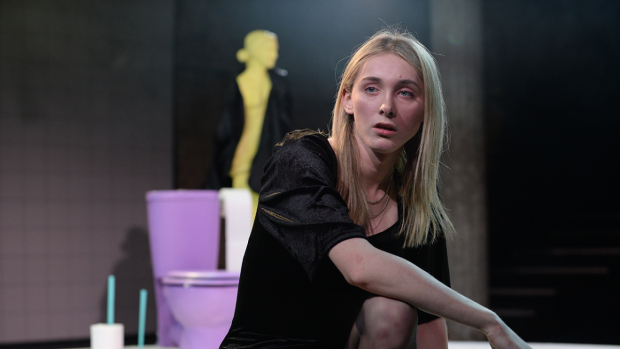
© Sharron Wallace
Overflow, reopening the ever-welcoming Bush Theatre in west London, begins with a fact – an indisputable statement drawn from verified sources: four out of every five transgender people in the UK experienced a form of trans hate crime in the last twelve months.
Playwright Travis Alabanza wrought a charged, unforgettable play in the form of Burgerz a handful of years ago – boiling down transphobic aggression and slicing apart its nuances with forensic glee.
They now return with a new piece set in a public toilet – a space which has, over the last couple of years, become an ideological battleground – fuelled by contrived controversies like cubicle provisions at large London theatres. Here, Alabanza bashes aside abstract opinions and social media-fuelled hearsay through lived experience – displaying a vivid reality where ostracisation is as unavoidable as the clamouring bangs on a cubicle door.
Directed by Debbie Hannan, we follow Rosie (a magnetic Reece Lyons, holding our attention for a full 70 minutes without a single lull) as she isolates herself in a club bathroom (an androgynous limbless statue, courtesy of designer Max Johns, being her sole company), away from outsiders seemingly intent on thumping against the door to her stall with relentless frequency. From there, Rosie reflects on her life – experiences she's had in similar settings with unnamed friends and comrades bound by shared experiences of predatory men on dancefloors.
There's a sense of melancholy rippling through the text – the way in which tolerance, latrine-based solidarity, seems to have trickled away in recent years. Acceptance might, scarily, be entropic. Questions suddenly stream forth like leaks in the battered lilac toilet: are we – the audience flanking the stage on three sides, complicit in Rosie's torment – with our silence harmful as the ominous knocks that rattle around the room? Johns has pools of water slowly seep across the stage – leaving Rosie trapped on top of a tank while on the search for dry land.
As much as it's her story, Alabanza is keen to lay out a coterie of side figures for Rosie to inhabit – each highlighting a different aspect of life in your early 30s. There's life friend Charlotte – "the best cisgender woman to ever exist and ultimate ally and protector of the trans" (a claim that is deconstructed with brutal efficiency), or Zee, a club-obtained chum giving Rosie life-tips from behind a smoking corner smoke screen. Quick flickers in the lighting from Jess Bernberg help Lyons hop between roles with ease.
But the productiom ends with more of a guttural cry even as its implications roar – a sudden rendition of "Shut Up and Let Me Go" accompanied by some unconvincing banging on pipes (conjuring unwanted Stomp vibes)
feeling slightly forced. For all the ferocity of Alabanza's writing, the production seems to miss that ultimate resounding climax. It is the words, the message, that last here – rather than the on-stage action.
A final note – special congratulations must go to the thorough, meticulous and consistently warm front of house team. This is obviously not exclusive to the Bush but, to feel safe and comfortable in an auditorium right now means so much more than it ever has done before.
Shows like Overflow aren't just the work of brilliant creatives – they are the result of an unwavering sense of solidarity between casual staff, artists and audience, all coming together in mutual celebration.












